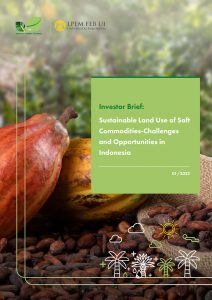Global Concern for Deforestation-free and Sustainable Supply Chains of Soft Commodities
Global demand for soft commodities continues to increase as the world’s population is expected to grow to almost 10 billion by 2050, accompanied by economic growth. These trends put pressure on land use as well as pose challenges for soft commodities supply chain sustainability.
Various elements of society, including businesses, have started to jack up their awareness of this issue. In November 2015, 14 US-based FMCG companies, such as General Mills, Mars Inc, and PepsiCo, signed a joint letter urging world leaders to adopt a strong global climate deal at the COP21 climate conference in Paris. The corporations emphasized in their letter that the government, civil society, and industry all had a role to play in combating climate change, and one of the three commitments they disclose was to increase the efforts to make their supply chains more sustainable (WWF, 2016). Five years later, at COP26, an ambitious strategy was announced by 12 of the largest agri-commodity traders including Wilmar and GAR from South-East Asia. They pledged to develop a sectoral roadmap initiative to keep temperature increase within 1.5 degrees. Numerous factors contribute to this trend, including consumer rejection of products that contribute to negative environmental and social outcomes; the naming and shaming of companies that engage in environmentally damaging manufacturing and sourcing processes; and increased investor awareness of market and reputational risks associated with commodity-driven deforestation (Pirard et al., 2015).
A variety of approaches have been implemented to support sustainable supply chain efforts, one of which is the implementation of sustainability standards through commodity certification. The table below maps some of the certifications for the main commodities in Indonesia.
